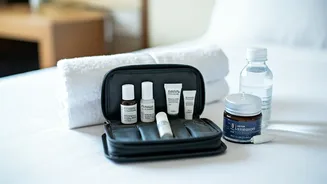Climate Chaos & Skin
One of the primary reasons your skin might react negatively while traveling is the change in environment. Your skin adapts to the climate where you reside,
and a shift to a new place can immediately throw off this balance. For example, if you're accustomed to a humid climate and travel to a dry, desert-like environment, your skin will likely experience dryness, flakiness, and increased sensitivity. Conversely, moving from a dry climate to a humid one can lead to excessive oil production, potentially causing breakouts. Different altitudes also affect skin, with higher altitudes often resulting in drier skin due to reduced air humidity. Furthermore, extreme weather conditions like intense sun exposure or cold winds can exacerbate skin problems, damaging the skin barrier and making it more prone to irritation and inflammation. Therefore, being mindful of the climate you're traveling to and adjusting your skincare routine accordingly is crucial.
Dietary Disruption Effects
Travel often means a departure from your regular diet, which can significantly influence your skin. You might find yourself eating richer, spicier, or simply different foods than usual. These dietary changes can cause inflammation, which often manifests as skin issues. For instance, consuming high-sugar or processed foods can lead to an increase in insulin levels, which can promote acne breakouts. Similarly, if your travel destination features a diet rich in dairy or gluten, and you're not accustomed to these, your skin might show signs of intolerance through blemishes, redness, or dryness. Additionally, the availability of fresh produce can vary, and a lack of essential nutrients can also impair your skin's health. Staying hydrated while traveling is another crucial aspect; inadequate water intake can make your skin dry and dull. So, being mindful of your diet and consciously selecting skin-friendly food options while traveling can minimize these negative effects.
Skincare Routine Overhaul
Travel can disrupt your regular skincare routine, often contributing to skin problems. Packing light might lead you to skip essential steps, or you could be using travel-sized products that aren't as effective as your usual ones. Changes in water quality, such as harder or more chlorinated water in hotels, can also impact your skin, leading to dryness or irritation. Moreover, the stress of travel itself can affect your skin. Stress hormones can trigger inflammation and exacerbate skin conditions. Another common issue is the over-washing of your face, particularly when you're trying to keep up with a heavy travel schedule. This can strip your skin of its natural oils, leading to dryness and potential breakouts. Making smart choices such as carrying your regular skincare products in travel-sized containers, using gentle cleansers, and hydrating your skin thoroughly are critical to maintaining skin health during your travels.
Water's Impact on Skin
Water quality differences from place to place can have a marked influence on your skin's condition when traveling. In many locales, the water may contain higher mineral content (hard water) or may be more heavily chlorinated. Hard water can leave your skin feeling dry and can also interfere with your skincare products, reducing their effectiveness, as it may prevent them from lathering properly or absorbing well. Chlorine, used to sanitize the water, can also be harsh, irritating skin and stripping away natural oils. The cumulative effect of these water-related factors can result in skin dryness, itching, and redness. In response, you might consider washing your face with bottled water or using a gentle, hydrating cleanser, and a rich moisturizer to combat these effects. Further, opting for showers over baths, if possible, can reduce your skin's exposure to potentially harsh water, helping to maintain your skin's natural moisture balance.
Stress's Manifestation
Travel, even if enjoyable, often brings with it higher stress levels, which can lead to skin issues. The pressure of navigating unfamiliar places, managing travel logistics, and potential changes in sleep patterns can all contribute to elevated stress hormones like cortisol, which, in turn, can trigger skin inflammation and worsen existing conditions. Cortisol increases oil production, which can cause acne, and also impairs the skin's barrier function, making it more vulnerable to irritants. Changes in sleep cycles can further exacerbate this issue, as insufficient rest impacts the skin's repair and renewal processes. If you recognize that travel is affecting your skin via stress, try including relaxing activities into your travel routine. These might include gentle stretching, meditation, or even simply enjoying a quiet moment with a good book. Prioritizing rest and relaxation can greatly reduce the skin's stress response and mitigate potential breakouts or flare-ups, allowing you to enjoy your trip more fully.
Proactive Travel Skincare
Before you even depart on your trip, planning your skincare regimen for your travel destinations can make a big difference. Begin by evaluating the climate of your destination and adjusting your skincare products accordingly. If you're going to a drier climate, pack a heavier moisturizer and hydrating serums. If the climate is more humid, choose lighter, oil-free products. Moreover, you should pack travel-sized versions of your everyday products and consider bringing a mini-kit containing essential items for sensitive skin, such as a gentle cleanser, a soothing toner, and a hydrating serum or mask. Don't forget sunscreen with high SPF to protect your skin from sun damage. Further, consider the availability of water at your destination and the potential need for bottled water for washing your face. Finally, remember to stay hydrated, both inside and out, by drinking plenty of water during your travels.




















